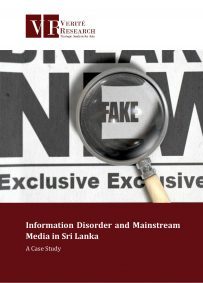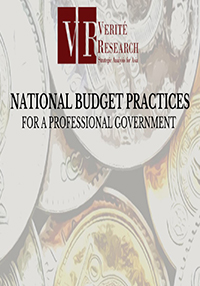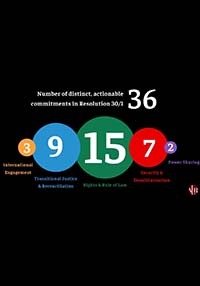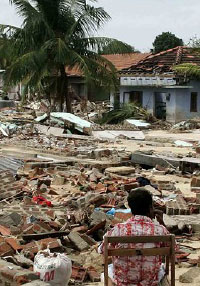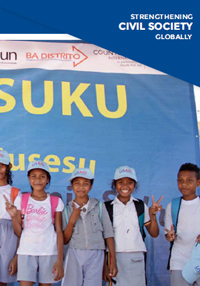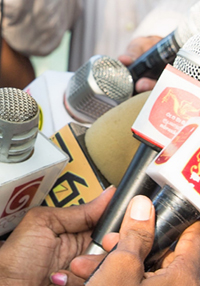A considerable amount of research on ‘fake news’ or information disorder tends to to focus on social media as the producer and distributor of false content. Within this discourse on information disorder, mainstream media is often positioned as an inadvertent distributor of false and harmful content – not as a producer of such content. Therefore, limited attention is paid to the role of mainstream media as both a producer and distributor of information disorder.
Verité Research conducted a forum on ” Improving National Budget Practices: Solutions for a Professional Government” on the 27th of February 2020 at Hilton Colombo. At this forum Verité Research discussed how the government can improve its budget process through better formulation, implementation and controls which will lead to effective and efficient management of public finance.
This is Verité Research’s latest study on the Sri Lankan government’s commitments on reconciliation and accountability. The 43rd UNHRC Session began in February 2020, and Sri Lanka’s progress in implementing Resolution 30/1 was taken up on 27 February 2020.
ශී්ර ලංකාවේ ආපදා කළමණාකරන ව්යුහයේ පවතින පරිපාලනමය හිඩැස් සම්බන්ධයෙන් වෙරිටේ පර්යේෂණායතනය දියත් කළ විමර්ෂණයකින් අනාවරණය වුනු තොරතුරු මෙම පර්යේෂණ සටහනෙහි අන්තර්ගත වේ.තොරතුරු දැනගැනීමේ පණතේ භාවිතාවන් මෙම විමර්ෂණය දියත් කිරීම සදහා භාවිතයට ගෙන ඇත.
කෝවිඞ් -19 වෛරසය පැතිරීම අවම කිරීම සඳහා ගෙන ඇති ක්රියාමාර්ග හේතුවෙන් ශ්රී ලංකා රජය අයවැය හා ආදායම් අර්බුදයකට මුහුණ දී තිබේ. මෙම අර්බුදයේ බොහෝ අවාසි පැවතුනත්, මෙම තත්ත්වය, ඇතැම් පාර්ශවකරුවන්ගේ අභිලාෂයන් අනුව කටයුතු කිරීමෙන් ඈත් වී, දුම්වැටි බදු ක්රියාත්මක කරන ආකාරය ක්රමවත් කිරීමට රජයට හොඳ අවස්ථාවක් ලෙස භාවිත කල හැකිය. මෙම විශ්ලේෂණය පෙන්වා දෙන්නේ ලංකාවේ දුම්වැටි බදු සහ මිල ගණන් ඉහල දැමීම, රාජ්ය මුල්ය කළමනාකරණ මුල ධර්ම වලට අනුකුලව සිදු වී නොමැති බවයි. රට රාජ්ය මුල්ය අර්බුදයකට මුහුණ දී තිබෙන අවස්තාවක උදාවන, මැයි 31 වන දිනට යෙදී තිබුන ලෝක දුම්කොළ විරෝධී දිනය අපට සිහිපත්කර දෙන්නේ දුම්වැටි බදු ක්රමානුකුලව ඉහල දැමීමට අසමත් වීම ශ්රී ලංකාවේ ආර්ථික ප්රතිපත්තියේ බරපතල අසාර්ථකත්වයක් බවයි.
At the end of 2018, the EPF resolved to re-enter the stock market despite substantial losses and allegations of mismanagement on EPF’s equity investments in the past. The EPF provides two reasons for the decision: (i) that members will benefit from higher returns; (ii) that the increase in EPF loanable funds will soon outstrip government requirements for additional borrowing. This Insight proves that both these reasons are analytically flawed.
The Civil Society Organization Sustainability Index (CSOSI) assesses the sustainability of the CSO sector across several countries in different regions around the world. Since its inception in 1997, it has expanded from covering 18 countries in the Europe and Eurasia Region, to covering a total of 72 countries in 2018, in regions including the Middle East, sub-Saharan Africa and Asia.
The Civil Society Organization Sustainability Index (CSOSI) assesses the sustainability of the CSO sector across several countries in different regions around the world. Since its inception in 1997, it has expanded from covering 18 countries in the Europe and Eurasia Region, to covering a total of 72 countries in 2018, in regions including the Middle East, sub-Saharan Africa and Asia.
මැතිවරණ සමයක දී මාධ්ය නියාමනය කිරීම සදහා මාර්ගෝපදේශයන් නිකුත් කිරීමෙහි ලා ශී්ර ලංකාවේ මැතිවරණ කොමිෂන් සභාව මෙරට ව්යවස්ථාවෙන්ම බලගන්වා තිබේ. මැතිවරණ සමයක දී මාධ්ය නියාමනය සම්බන්ධයෙන් වර්තමානයේ පවත්නා කතිකාවත වඩාත්ම කේන්ද්රගතව තිබෙන්නේ රාජ්ය මාධ්යයන් නියාමනය කිරීම සදහා මෙම මාර්ගෝපදේශයන් භාවිතාවන ආකාරය පිළිබදවය. නමුත් එපමණකින් සීමා නොවී මැතිවරණ සමයක දී, පෞද්ගලික හිමිකාරීත්වයක් ඇති මාධ්ය නියාමනය කිරීමට පවා ශී්ර ලංකා ව්යවස්ථාවෙන් මැතිවරණ කොමිෂන් සභාව බලගන්වා තිබෙන ආකාරය මෙම දැනුම්වත් කිරීමේ සටහනින් අධ්යනය කෙරේ.
The Election Commission of Sri Lanka is constitutionally empowered to regulate the media during an election period by issuing media guidelines.The present discourse on media regulation during elections focuses on how these guidelines have been used to regulate state-owned media. This briefing note examines how the Election Commission is also constitutionally empowered to regulate the privately-owned media during an election period.
